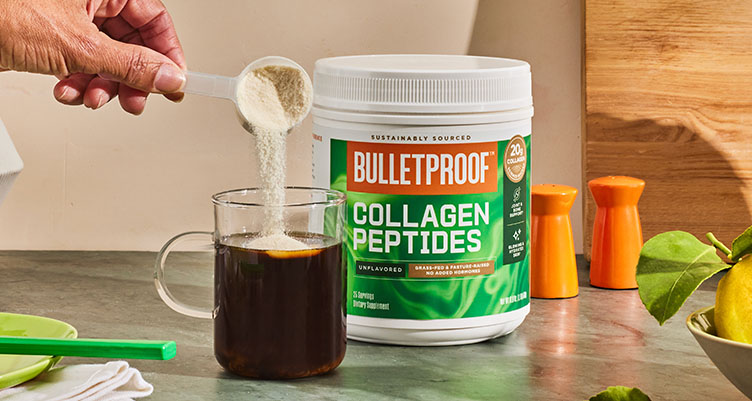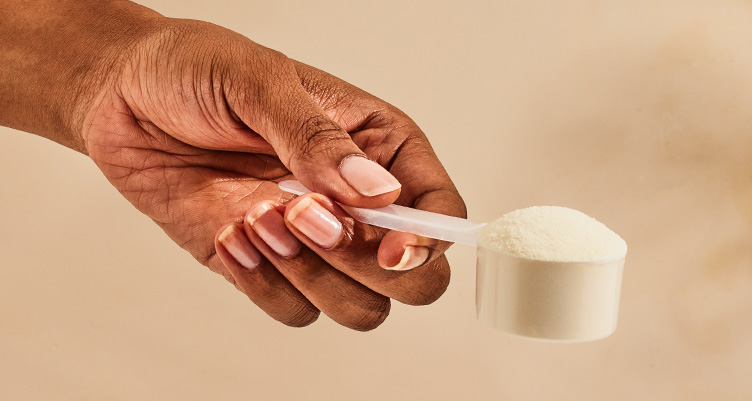Collagen vs. Collagen Peptides: What’s the Difference?

- Collagen peptides refers to collagen that has undergone hydrolysis, a process that breaks down animal-sourced collagen so it’s more easily digestible by the body.
- The benefits have long been heralded, both in studies and by word of mouth: Collagen supplementation can help support healthy skin, nails, joints, and hair.
- Collagen comes in a variety of forms to suit one’s personal preference. This includes collagen powders and collagen bars.
Collagen is the body’s most abundant protein, and is instrumental in supporting skin, nails, joint and hair health.
Unfortunately, as is the case with all good things in life, our collagen levels don’t remain the same. As we grow older, the body’s natural collagen production decreases, leading to the formation of wrinkles, fine lines, joint discomfort, and slower muscle recovery.[1][2]
One way to support this inevitable change is by introducing collagen peptide supplements to your diet.
Collagen vs. Collagen Peptides
On the surface, collagen and collagen peptides sound like the same thing. They’re both associated with a slew of health benefits we all may take for granted — like the ability to freely move our legs and arms — and are thus used interchangeably. Simply put, without collagen, the body would have no structure and would not be able to perform. It’s instrumental in forming the body’s structure (it is the most abundant protein in the body) and in keeping the body flexible. Collagen peptides give the body amino acids that are essential in maintaining healthy skin, bones, and joints.[3] These amino acids are not available from other, regularly-eaten protein sources, like chicken, beef or tofu. Collagen is the glue that holds everything together. There is a difference between the two terms. Collagen is the body’s most abundant, naturally-produced protein, whereas collagen peptides are the hydrolyzed (i.e. digestible) version of that. Hydrolyzed collagen, used in supplements, also easily dissolves in liquids for easy consumption. This solubility wouldn’t be the case for collagen that isn’t hydrolyzed.
What Are Collagen Peptides?

As previously stated, collagen peptides are the broken-down, hydrolyzed version of collagen. It’s bioavailable, meaning that it can be consumed and digested by the body so we can begin reaping its many benefits.[4]
There are five common types of collagen: I, II, III, V, and X — all of which can be found in some collagen peptide supplements.
Type I: Type I collagen is considered the building block of bone, skin, and connective tissue.[5]
Type II: Found in cartilage, type II collagen is responsible for providing flexibility and support to bone joints.[6]
Type III: Type III collagen can be found in the same locations as type I collagen. Type III is a key component of our organs and skin.[7]
Type V: Type V collagen is involved in the development of the collagen fibers of connective tissues.[8]
Type X: Type X collagen helps bone formation in articular cartilage.[9]
At Bulletproof, we use collagen types I and III — the most common, naturally occurring types in the body — in effective, science-backed doses to help maintain skin, bone and joint health.†
The Benefits of Collagen Peptides

While collagen and collagen peptides have long been associated with beauty benefits (fewer wrinkles and better skin hydration), results from collagen peptide supplementation also involve joints, ligaments, and muscles.[10] And the best part? Adding collagen peptides to your daily routine can happen day or night — it all really depends on your schedule and preference.
Taking collagen peptides before going to bed can support sleep[11], along with healthy skin, bones and joints.[12] Taking 2.5-15 g of collagen is typically suggested.
Types of Collagen Peptide Supplements
There are countless collagen peptide supplements on the market that complement different lifestyles and personal preferences, ranging from unflavored and flavored collagen powders and collagen capsules to collagen-packed products that also benefit gut health and support stress relief with consistent use. For those who prefer to increase their daily collagen intake on the go, liquid collagen (collagen-infused beverages) are also available.
Final Thoughts
While there haven’t been as many mainstream studies surrounding collagen peptide use as there are, say, studies around melatonin benefits, the industry continues to thrive. Whether one’s goal is to achieve more youthful-looking skin or stronger nails, or relieving knee discomfort from excessive exercise, there’s a collagen supplement out there for everyone.
A look at testimonials from those who’ve experienced the benefits of collagen peptides put the anecdotal spotlight on the compelling effects collagen peptide powders, bars, or capsules can have on individual wellness journeys.
It’s important to note, however, that everyone’s story and experience is different and should not be viewed as the baseline of what should be expected in every situation. There isn’t a universal daily serving size; everyone’s needs and goals vary and are dependent on key factors such as age, weight, and sex.
We always recommend consulting with your licensed healthcare practitioner before introducing a new supplement to your diet.
Sign up for early access to sales, product launches, the latest Bulletproof news and more!



